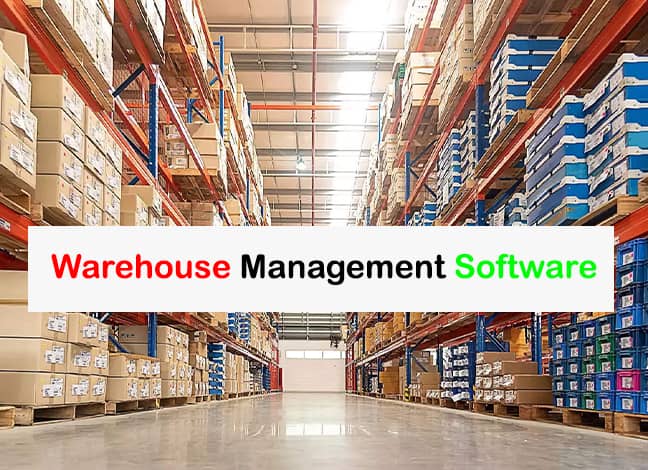What does it mean by the term ‘Warehouse Management System’ (WMS)?
A warehouse management system (WMS) is a software application that supports the day-to-day operations in a warehouse. A warehouse management system can be used to track inventory, manage stock levels, and organize the storage and restoration of goods. In many cases, a warehouse management system will also include features for managing labor resources and tracking the movement of goods through the warehouse.
It is designed to streamline the flow of information and goods within a warehouse. By automating and integrating the various tasks and processes that are required to run a warehouse, a warehouse management system can help to improve efficiency and productivity. In turn, this can help to reduce costs and improve customer service.
To keep tabs on stock quantities and locations, a warehouse management system needs to be implemented. Reports that might also help to optimize the stock levels and enhance inventory management can be produced using this data. Managing labor resources is another feature of it. A warehouse management system can help in identifying limitations and locations where labor resources can be more effectively used by monitoring the flow of items through the warehouse. This system can be used to monitor the employee’s performance and productivity.
Improving customer service is another area where warehouse management systems can be utilized. In order to better serve customers, a warehouse management system tracks the flow of items through the warehouse. Furthermore, the information generated by a warehouse management system can be also used to better understand customer behavior.
What kind of Warehouse Management Software System do businesses need?
Warehouse management software systems are essential for businesses that need to manage and organize their inventory and resources effectively. With the right system in place, businesses can track and monitor their inventory levels, improve their order fulfillment processes, and increase overall efficiency in their operations.
There are many different types of warehouse management software systems available on the market, and each one offers its own unique set of features and capabilities. Some systems are designed for small businesses with a limited number of products, while others are built to handle the complex requirements of large enterprises with hundreds or even thousands of different products.
One of the key features that businesses should look for in a warehouse management software system is the ability to track inventory levels in real time. This is important because it allows businesses to quickly and easily see how much of a particular product they have on hand, and to order more before they run out. This can help prevent stockouts and lost sales, and can also help businesses avoid overstocking and incurring unnecessary storage costs.
Another important feature of warehouse management software systems is the ability to automate and streamline order fulfillment processes. This can include features like automatic order picking, packing, and shipping, as well as integration with popular e-commerce platforms and shipping carriers. By automating these processes, businesses can save time and reduce the likelihood of errors, which can improve customer satisfaction and help reduce overall operating costs.
Consequently, a competent warehouse management software system can offer businesses a number of advantages, including better inventory control, faster order fulfillment, and cost savings. Businesses can make sure that their warehouse operations are operating smoothly and effectively by carefully choosing the best solution for their unique requirements, freeing them up to focus on other crucial parts of their operations.
Types of Warehouse Management software and their Advantages and Disadvantages
A warehouse management system (WMS) is a key part of any warehouse or distribution operation. By automating the receiving, storage, and shipping of goods, a WMS can help improve accuracy and efficiency while reducing operating costs. In addition, a WMS can help to improve customer service by providing real-time visibility into inventory levels and order status.
There are several different types of WMS systems on the market, each with its own advantages and disadvantages. Here is a brief overview of some of the most popular WMS solutions:
- Enterprise WMS: An enterprise WMS is a comprehensive solution that can be used to manage all aspects of the warehouse, from receiving and put-away to picking and shipping. Enterprise WMS systems are typically much more expensive than other types of WMS solutions and can require a significant investment in time and resources to implement and maintain. However, enterprise WMS can offer a number of advantages, including the ability to support multiple warehouses, locations, and users; real-time visibility into inventory levels and order status; and advanced features such as warehouse slotting and labor management.
- Cloud-based WMS: A cloud-based WMS is a software-as-a-service (SaaS) solution that is hosted on the vendor’s servers and accessed via the internet. For this reason, many small and medium-sized organizations (SMEs) are looking to cloud-based WMS solutions as an alternative to more costly corporate WMS systems. But cloud-based WMS solutions might not have the same level of features and ability to grow as an enterprise WMS.
- Radio frequency (RF) WMS: An RF WMS is a wireless solution that uses handheld RF devices to track inventory and manage warehouse operations. In addition to real-time inventory tracking, RF WMS systems can also eliminate data input mistakes and increase pick accuracy. However, RF WMS systems can be more expensive to set up than other types of WMS solutions and may need specialized hardware and infrastructure.
- Voice-enabled WMS: A voice-enabled WMS is a warehouse management solution that uses voice-recognition technology to capture and track data. Voice-enabled WMS systems can offer a number of advantages, including increased accuracy and productivity, hands-free data entry, and the ability to support multiple languages. However, voice-enabled WMS systems can be more expensive to implement than other types of WMS solutions and may require specialized hardware and infrastructure.
- Warehouse control system (WCS): A warehouse control system (WCS) is a comprehensive solution that is used to manage all aspects of the warehouse, from receiving and put-away to picking and shipping. A WCS can offer a number of advantages, including the ability to support multiple warehouses, locations, and users; real-time visibility into inventory levels and order status; and advanced features such as warehouse slotting and labor management. However, a WCS can be much more expensive to implement and maintain than other types of WMS solutions.
conclusion
In conclusion, a warehouse software system is an excellent financial investment for businesses looking to enhance their warehouse operations and acquire a competitive edge. A warehouse software system can aid a company’s success by automating processes, raising productivity, and revealing stock levels in real-time.




















